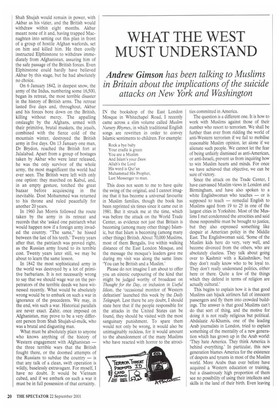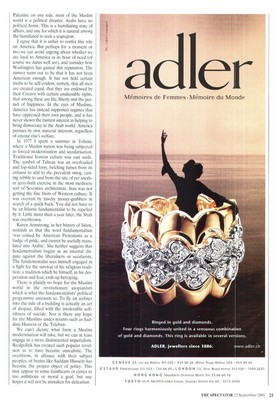WHAT THE WEST MUST UNDERSTAND
Andrew Gimson has been talking to Muslims
in Britain about the implications of the suicide attacks on New York and Washington
IN the bookshop of the East London Mosque in Whitechapel Road, I recently came across a slim volume called Muslim Nursery Rhymes, in which traditional English songs are rewritten in order to convey Islamic sentiments to children. For example: Rock a bye baby Your cradle is green You are a Muslim And Islam's your Dan
Allah's the Lord His word is Qur'an Muhammad His Prophet, Last Messenger to man.
This does not seem to me to have quite the swing of the original, and I cannot imagine that it has become a universal favourite in Muslim families, though the book has been reprinted six times since it came out in 1981. But it struck me at the time, which was before the attack on the World Trade Center, as evidence not just that Britain is becoming (among many other things) Islamic, but that Islam is becoming (among many other things) British. About 70,000 Muslims, most of them Bengalis, live within walking distance of the East London Mosque, and the message the mosque's leaders gave me during my visit was along the same lines: 'You can be British and a Muslim.'
Please do not imagine I am about to offer you an eirenic outpouring of the kind that might be judged worthy of broadcast on Thought for the Day, or inclusion in Useful Idiots, the 'occasional monitor of Western defeatism' launched this week by the Daily Telegraph. Lest there be any doubt, I should state here that if the people responsible for the attacks in the United States can be found, they should be visited with the most sanguinary punishment. To spare them would not only be wrong, it would also be unimaginably reckless, for it would amount to the abandonment of the many Muslims who have reacted with horror to the atroci
ties committed in America.
The question is a different one. It is how to work with Muslims against those of their number who resort to terrorism. We shall be further than ever from ridding the world of anti-Western terrorism if we fail to mobilise reasonable Muslim opinion, let alone if we alienate such people. We cannot let the fear of being unfairly dismissed as anti-American, or anti-Israeli, prevent us from inquiring how to win Muslim hearts and minds. For once we have achieved that objective, we can be sure of victory.
Since the attack on the Trade Center, I have canvassed Muslim views in London and Birmingham, and have also spoken to a white Englishwoman who teaches — or is supposed to teach — remedial English to Muslims aged from 19 to 25 in one of the largest cities in Yorkshire. Most of the Muslims I met condemned the atrocities and said those responsible must be brought to justice, but they also expressed something like despair at American policy in the Middle East. The Englishwoman said, 'Some of the Muslim kids here do very, very well, and become divorced from the others, who are absolutely clueless. They talk about going over to Kashmir with a Kalashnikov, but they don't really know who to be loyal to. They don't really understand politics, either here or there. Quite a few of the things which they defend in terms of religion are actually cultural.'
This begins to explain how it is that good Muslims can hijack airliners full of innocent passengers and fly them into crowded buildings. The answer is that good Muslims can't do that sort of thing, and the motive for doing it is not really religious but political. Abdalaziz Al-IChamis, one of the leading Arab journalists in London, tried to explain something of the mentality of a new generation which has grown up in the Arab world: 'They hate America. They think America is behind everything.' In particular, this new generation blames America for the existence of despots and tyrants in most of the Muslim world. More Arabs than ever before have acquired a Western education or training, but a disastrously high proportion of them see no possibility of using their intellects and skills in the land of their birth. Even leaving Palestine on one side, most of the Muslim world is a political disaster. Arabs have no political home. This is a humiliating state of affairs, and one for which it is natural among the humiliated to seek a scapegoat.
I agree that it is unfair to confer this role on America. But perhaps for a moment or two we can avoid arguing about whether we are loyal to America in its hour of need (of course we damn well are), and consider how Washington has gained this reputation. The answer turns out to be that it has not been American enough. It has not held certain truths to be self-evident, namely, that all men are created equal, that they are endowed by their Creator with certain unalienable rights, that among these are life, liberty and the pursuit of happiness. In the eyes of Muslims. America has instead supported regimes that have oppressed their own people, and it has never shown the faintest interest in helping to bring democracy to the Arab world. America pursues its own material interests, regardless of anyone else's welfare.
In 1977 I spent a summer in Tehran, where a Muslim nation was being subjected to forced modernisation and secularisation. Traditional Iranian culture was cast aside. The symbol of Tehran was an overloaded and lop-sided lorry, belching fumes from its exhaust to add to the prevalent smog, carting rubble to and from the site of yet another jerry-built exercise in the most mediocre sort of Seventies architecture. Iran was not getting the fine fruits of Western culture. It was overrun by tawdry money-grubbers in search of a quick buck. You did not have to be an Islamic fundamentalist to be repelled by it. Little more than a year later, the Shah was overthrown.
Karen Armstrong, in her history of Islam, reminds us that the word fundamentalism 'was coined by American Protestants as a badge of pride, and cannot be usefully translated into Arabic'. She further suggests that fundamentalism begins as an internal dispute against the liberalisers or secularists. The fundamentalist sees himself engaged in a fight for the survival of his religious tradition: a tradition which he himself, in his desperation and fear, ends up betraying.
There is plainly no hope for the Muslim world in the revolutionary utopianism which is what the fundamentalists' political programme amounts to. To fly an airliner into the side of a building is actually an act of despair, filled with the intolerable selfishness of suicide. Nor is there any hope for the Muslims under tyrants such as Saddam Hussein or the Taleban.
We can't dictate what form a Muslim modernisation will take, but we can at least engage in a more disinterested imperialism. Realpolitik has created such popular revulsion as to have become unrealistic. The overthrow, in alliance with their subject peoples, of brutes like Saddam Hussein has become the proper object of policy. This may appear to some fainthearts or cynics as too ambitious or moral a goal, but one hopes it will not be mistaken for defeatism.











































































 Previous page
Previous page